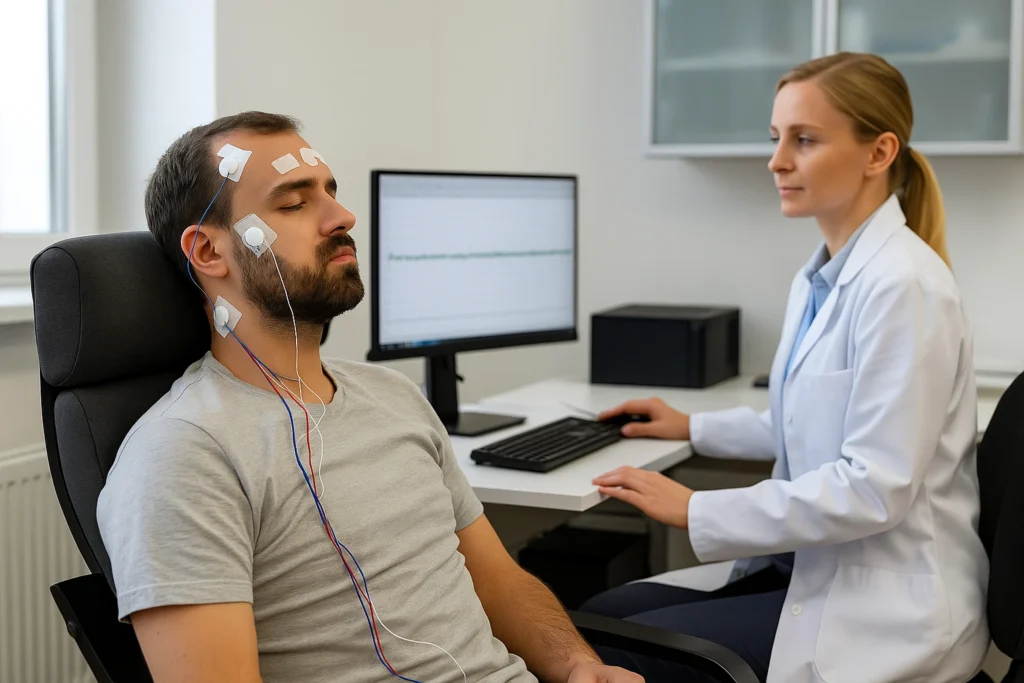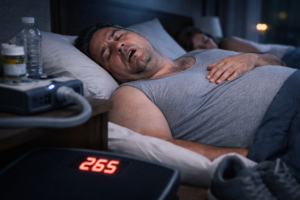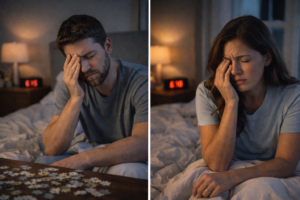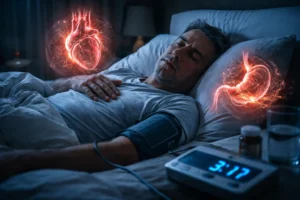What Is the Maintenance of a Wakefulness Test?
The maintenance of wakefulness test (MWT) is a specialized evaluation used to measure a person’s ability to stay awake during the day. This test is an important tool in sleepiness assessment, particularly for individuals who may have excessive daytime sleepiness that impacts daily activities, work, or safety.
Unlike tests that measure how quickly someone falls asleep, the MWT assesses how well a person can remain awake in a quiet, low‑stimulus environment. It is often part of a broader sleep disorder evaluation conducted at a sleep clinic.
Why the MWT Matters in Sleep Disorder Evaluation
The maintenance of wakefulness test provides valuable information for diagnosing and managing various sleep conditions. It is commonly used to evaluate the effectiveness of treatment for disorders such as narcolepsy, obstructive sleep apnea, and idiopathic hypersomnia.
For patients in certain professions—such as commercial driving or aviation—daytime sleepiness testing can be essential for safety clearance. A successful result can demonstrate that treatment is effectively managing symptoms, reducing the risk of fatigue‑related incidents.
How the MWT Works
The MWT is typically conducted in a sleep clinic testing setting. The procedure involves several trials, each lasting around 40 minutes, where the patient sits comfortably in a quiet, dimly lit room and is instructed to try to stay awake. Sensors measure brain activity, eye movements, and other physiological signals to determine if and when sleep occurs.
Key points about the test:
- It is performed during the daytime, usually following an overnight sleep study.
- Multiple sessions are spaced out over several hours.
- Results are based on the patient’s ability to remain awake across trials.
This approach gives sleep specialists objective data to guide treatment recommendations.
When Is the Maintenance of Wakefulness Test Recommended?
A maintenance of wakefulness test may be recommended for:
- Patients being treated for sleep disorders who need assessment of treatment effectiveness.
- Individuals undergoing safety evaluations for jobs requiring sustained alertness.
- Cases where a sleep disorder evaluation suggests unexplained or persistent daytime sleepiness.
It is often used alongside other assessments, such as polysomnography or the multiple sleep latency test, to provide a complete picture of the patient’s sleep health.
The Role of Sleep Clinics in Administering the MWT
A qualified sleep clinic ensures the MWT is performed according to standard protocols. Professional sleep clinic testing includes preparation, proper setup of monitoring equipment, and careful analysis of results.
The data from the test allows clinicians to:
- Confirm the effectiveness of ongoing treatment.
- Adjust therapy if excessive sleepiness persists.
- Provide documentation for occupational health or legal requirements.

Final Thoughts on the Maintenance of Wakefulness Test
The maintenance of wakefulness test is a valuable tool for understanding and managing daytime sleepiness. By providing objective data on a person’s ability to remain awake, the test plays a crucial role in both treatment management and safety evaluations.
For anyone experiencing excessive daytime sleepiness or requiring a formal sleepiness assessment, the MWT offers clear, reliable results.
📞 Contact our sleep clinic today to learn more about the maintenance of wakefulness test and schedule your evaluation.
FAQ About the Maintenance of Wakefulness Test
1. What is the maintenance of wakefulness test?
The maintenance of wakefulness test (MWT) measures a person’s ability to stay awake during the day in a controlled setting.
2. Why is the MWT important?
It helps evaluate treatment effectiveness for sleep disorders and ensures patients can maintain alertness for daily tasks or safety‑sensitive jobs.
3. How is daytime sleepiness testing performed?
Patients participate in multiple sessions of sitting quietly while trying to remain awake, monitored by sensors that track brain and eye activity.
4. When is the MWT recommended?
It is recommended for treatment follow‑up, occupational evaluations, or when a sleep disorder evaluation identifies persistent daytime sleepiness.
5. Where can I take the MWT?
The test is conducted at specialized facilities as part of sleep clinic testing by qualified sleep professionals.








